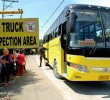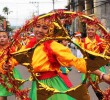DAVAO CITY – Workers held a short program in Plaza Miranda, Manila today to celebrate the late labor leader, Crispin Beltran’s 83rd birthday.
Beltran, also known as Ka Bel, was a former partylist representative of the progressive Anakpawis Partylist. Beltran died on May 20, 2008 after falling from the roof of his home which he was repairing.
During the program, labor advocates dared candidates to emulate Beltran’s example of standing up for the country’s workers.
“As a labor leader and party-list representative, Ka Bel lived a life of service to Filipino workers which should be emulated by all politicians. We challenge candidates to speak up for higher wages, regular employment, safer workplaces and free exercise of trade-union rights,” said Elmer Labog, Kilusang Mayo Uno chairperson.
Labog said Beltran, as a former representative of partylist groups Bayan Muna and Anakpawis, “consistently championed workers’ demand for a P125 across-the-board wage hike, an end to the regionalization of wages, the junking of contractualization, and a stop to union-busting drives.”
“Workers and Filipinos need more people like Ka Bel in government. The country is in such a bad shape at present partly because people who are the opposite of what Ka Bel was, those who serve big capitalists over workers, are the ones occupying the top positions in government,” Labog added.
Workers from Planters Development Bank, AGC Flat Glass Philippines, Tanduay Distillers, Inc. and Kentex Manufacturing Inc. also spoke up about their present struggles and aired their demands to politicians.
“The great thing about Ka Bel as a labor leader and congressman is that he did not confine the workers’ struggles to the halls of Congress. He believed that advancing the rights and interests of workers entail the unity and collective action of workers themselves in their workplaces and communities,” Labog said.
Labog said Beltran dreamed of a Philippines “led by workers and the toiling masses and achieving genuine development for the country through national industrialization and land reform.” (davaotoday.com)










